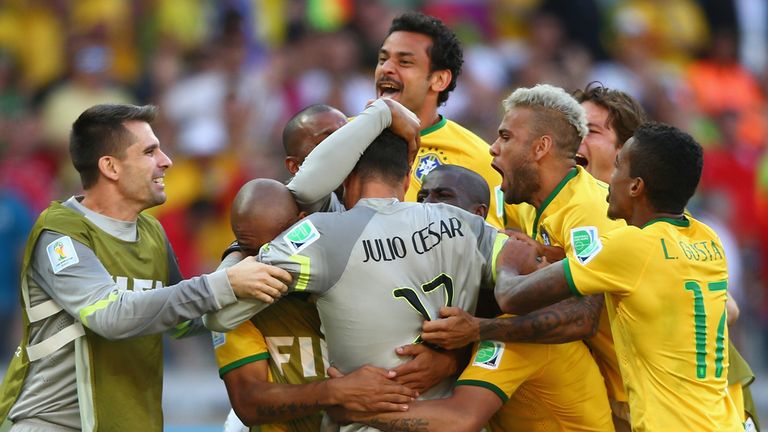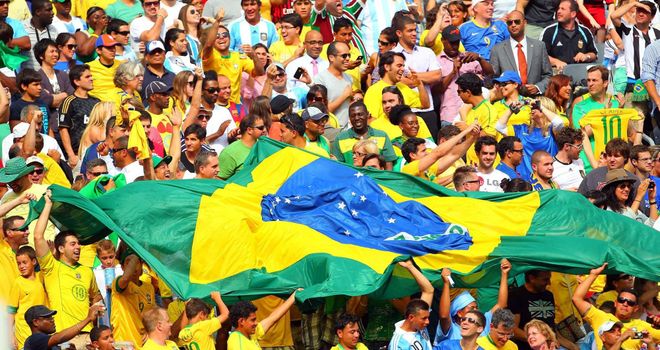http://www1.skysports.com/FIFA-World-Cu ... d-cup-ever" onclick="window.open(this.href);return false;
Goals galore, incredible atmospheres, superstar players and much more. We provide a few reasons why, in 2014, we might just be witnessing the best World Cup in history.

The 2014 World Cup in Brazil is going to live long in the memory and there is a chance now for fans to take a breather and reflect on what has come before.
A growing consensus among great swathes of the viewing public is that this World Cup may even be the best ever. Here, we look at 10 reasons why such a call might be on the money.
Goals
Quite simply, goals are the most important things in football. They get the crowd on their feet and can bring an otherwise mundane game to life, and in Brazil we have seen plenty of them.
There have been more goals per game than in South Africa four years ago and the quantity of these goals has also been impressive. None more so than James Rodriguez’s stunning volley against Uruguay in the first knockout round. Neymar and Lionel Messi have also got in on the act, with other memorable efforts coming from the likes of Jermaine Jones for the USA and Australia's former Everton star, Tim Cahill.
Ball
One of the reasons why we have seen a number of spectacular goals scored is a World Cup ball that actually seems to act like a football rather than the beach ball-like efforts of recent tournaments.

The brazuca is the most tested World Cup ball ever, with adidas spending two-and-a-half years developing it. The result is a ball that has made no negative headlines whatsoever, a pleasant change when compared to the much maligned jubilani in South Africa and the Fernova used at the 2002 World Cup.
Those two tournaments saw the ball sailing over the bar on a regular basis, as the camera panned to a bemused looking striker. Goals direct from free-kicks were also a rare sight, with Diego Forlan seemingly the only player able to truly master the jubilani in 2010.
This time around, it has all been different. There has been no fuss about the ball, no goalkeepers complaining, no perfectly struck shots disappearing into orbit. The ball has simply behaved exactly as it should and you can ask for no more than that.
Tactical variety
They say styles make fights and that has certainly been the case at this World Cup. The ubiquity of 4-2-3-1 four years ago has become more nuanced with a variety of formations creating interesting clashes. Spaces and overloads lead to goals.
Big names produce
Four years ago, the stage seemed set for Messi, fresh from having helped deliver a second consecutive La Liga title to Barcelona, to confirm himself as one of the sport’s all-time greats. Five games, no goals and a humiliating quarter-final exit to Germany later and the Argentine was labelled a flop.
Upsets
Everybody loves an underdog, or so we are told. So perhaps it is no wonder people have been falling over themselves to label this the best World Cup ever as relative minnows overcame the odds and beat the traditional powerhouses.
Attacking football
Previous World Cups have seen a plethora of drab matches as teams go out with the sole aim of avoiding defeat. Smaller nations, keen to avoid embarrassing score-lines, sat deep and looked to nick a goal from a set-piece or the occasional two-man counter-attack.
Unpredictable
While this has been a wonderful tournament, it can be argued that we have not seen a truly great team. There are plenty of good teams but it is difficult to choose one that stands out as the best. Some would see this as a negative but the unpredictability that it has led to can only be a positive.
Of the last eight ties, it was of course the favourites who progressed but that there was no more than a solitary goal that separated any of the four matches said a lot.
Fans
There are plenty of theories as to why this World Cup has been breaking records in terms of goals, but one factor that appears to have been overlooked is the influence of the Brazilian fans.

The host nation invariably plays an enormous role in deciding the success of a tournament and in Brazil the locals are demanding only the best from the players on the pitch. Their appreciation of high-scoring matches has been conveyed through the raucous atmospheres in stadiums across the country, with teams who intend to attack roared on by yellow-clad supporters.
It is a different football culture in Brazil and one that does not value defensive resolve among its primary concerns. Indeed, the cause of the underdog is lost on many Brazilians, who would even prefer to see Messi curl in a sensational winner for bitter rivals Argentina than cheer Iran’s battling spirit. That fact has become even more apparent in the recent spate of tight encounters as a disgust of attritional football has been readily expressed.
Technology
Goal-line technology is finally in use at a major international tournament, meaning there should be no repeat of moments like Frank Lampard’s ‘goal’ against Germany in 2010. The system has worked perfectly throughout, even if there was a moment of slight confusion in the France versus Honduras game before a goal was correctly awarded.
Given the success of the technology in the Premier League last season and during the World Cup it really is a wonder why it was not brought in earlier. Better late than never, though.
The other, rather less hi-tech, introduction during this World Cup has been that of the foam used by referees to ensure that defensive walls remain 10 yards away for free-kicks. It is a simple but very effective idea and one that seemed to get fans talking almost as much as the football itself early in the tournament. A superb addition.
Brazil – ‘Spiritual home’
Though we may claim that England is the true home of football, there can be little doubt that Brazil is the game’s spiritual home. The five-time World Cup winners are the most famous footballing nation on the planet and there is something a bit special about having the tournament there. There was lots of talk about there being a carnival atmosphere, samba beats and Brazilian flair as the tournament approached but clichéd as it was, that has turned out to be the case.
Protests against FIFA and against the Brazilian government for spending money on stadiums rather than helping the people have taken place but have remained largely peaceful, easing any fears that they could overshadow the tournament and, indeed, the majority of locals seem to have revelled in having the tournament in their country.










